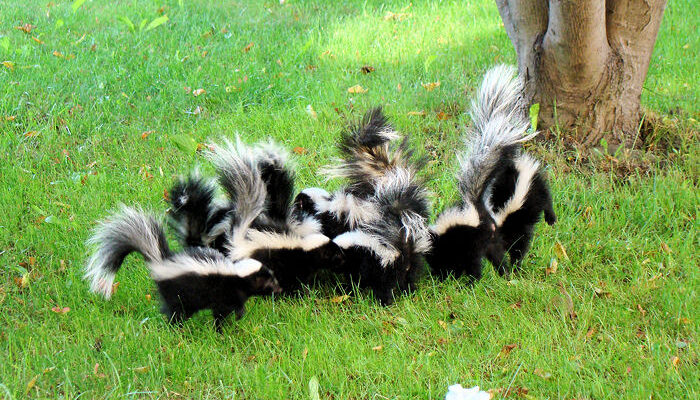Skunks are known for their distinctive black-and-white appearance—and even more for the powerful odor they release when threatened. While generally non-aggressive, skunks can become a serious problem when they make your yard, garden, or under-deck space their home. Encountering one on your property may seem alarming, but with the right approach, you can handle the situation safely and effectively.
Here’s a step-by-step guide on what to do if you spot a skunk nearby—and how to avoid making the situation worse.
1. Stay Calm and Don’t Startle It
The most important thing to do is remain calm. Skunks only spray as a last resort when they feel cornered or threatened. Sudden movements, loud noises, or trying to chase them away can trigger a spray.
Do:
- Slowly back away
- Keep pets and children indoors
- Avoid shining bright lights directly at the skunk
Give the animal time and space to leave on its own if possible.
2. Observe Its Behavior
If the skunk is simply passing through, there may be no need to take further action. However, if it seems to be hanging around your property regularly—especially at dusk or dawn—it may have found a den nearby.
Signs of a Skunk Nest:
- A strong, musky odor in a specific area
- Cone-shaped holes dug in the lawn (in search of grubs)
- Skunk sightings multiple times over several days
- Noises beneath porches, decks, or sheds
Repeated sightings indicate it’s time to act.
3. Do Not Attempt to Trap or Remove It Yourself
Skunks are wild animals, and trying to trap one on your own is risky. In addition to the high likelihood of getting sprayed, improper handling could lead to bites or exposure to diseases like rabies.
In many areas, it’s also illegal to trap and relocate wildlife without a permit.
4. Secure Your Property and Remove Attractants
To make your property less inviting to skunks, take preventive steps:
- Close off crawlspaces and gaps beneath porches or sheds
- Store trash in sealed bins
- Remove pet food and bird seed from outside areas
- Keep compost piles secured
- Install motion-activated lights to deter nighttime visits
Reducing food sources and hiding spots will encourage the skunk to move on naturally.
Midway through noticing frequent skunk activity, it’s wise to consult Capital Wildlife skunk removal for a professional, humane solution. Their trained specialists use safe and legal exclusion techniques, combined with property inspections and repair services, to ensure skunks are removed without harm—and stay gone.
5. Schedule a Professional Inspection
A wildlife removal expert will inspect your property for:
- Entry points
- Signs of nesting
- Food and water sources
- Damage caused by digging or spraying
From there, they can set up one-way exclusion devices and seal access points to prevent future intrusions.
6. What If You or a Pet Gets Sprayed?
If a skunk does spray, the odor can be overwhelming. For pets, use a mix of hydrogen peroxide, baking soda, and dish soap (never tomato juice—it’s a myth). For humans, multiple showers and outdoor airing of clothing may be needed. Ventilate your home and consider professional odor removal if the smell persists indoors.
Conclusion
While skunks aren’t typically aggressive, their spray and potential to carry disease make them unwelcome guests on your property. By staying calm, avoiding confrontation, and calling professionals like Capital Wildlife skunk removal, you can handle the situation safely and effectively. With humane exclusion methods and prevention tips, you’ll ensure your home remains skunk-free—without the stink.
